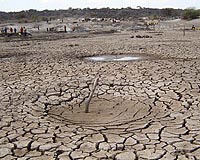 |
Sao Paulo, Brazil (AFP) Nov 15, 2009 Environmentalists on Sunday warned bluefin tuna was on its way to extinction after a international meeting of fishery ministry officials trimmed catch quotas but upheld continued hauls of the fish, prized in sushi dishes. "After meeting for 10 days, the International Commission for the Conservation of Atlantic Tunas (ICCAT) refused to end fishing for Atlantic bluefin tuna," the Pew Environment Group, a US organization that sat on in the meeting in Recife, Brazil, said in a statement. "Instead, ICCAT set the catch limit for bluefin, considered the most valuable fish in the sea, at 13,500 tons," it said. That is down from the 19,950-ton quota originally decided for 2010 in an EU accord with ICCAT in Brussels in April this year. Ecological outfits warned that bluefin tuna faced disappearance because of overfishing in the Mediterranean and Atlantic, mainly for lucrative markets in Asia, especially Japan. Yearly quotas set up by ICCAT are systematically exceeded by industrial fleets. That and illegal fishing have caused the population to decline by more than 85 percent in the eastern Atlantic and by more than 90 percent in the western Atlantic. ICCAT "has failed once again to act beyond the interests of a few tuna fishing and farming industries," Greenpeace said in a statement. "Again it has approved recommendations which fail to ensure the recovery of Atlantic bluefin tuna." It said that a catch limit of 8,000 tons would have given bluefin tuna "a 50 percent chance of stocks recovering by 2023," Greenpeace said. Susan Lieberman, the head of international policy for the Pew Environmental Group, told AFP in a telephone interview that while a quota cut was a positive step, it was "too little too late" and was "not enough for even 50 percent chance of recovering the species." "We were calling for a suspension" of all bluefin tuna catches for at least a year, or, failing that, the quota of "8,000 tons or less," she said. "What they are doing is responding to economic pressures from the fishing industry. But in the long term there won't be a fishing industry," she said. Other groups, including Greenpeace, were equally disappointed by Sunday's decision. Environmental groups are now backing a call from Monaco for the issue of bluefin tuna to be taken before a March meeting of CITES, an international body that sets rules against illegal wildlife trade, with the aim of declaring the fish endangered and putting a ban on catching it. Francois Provost, Greenpeace International oceans campaigner, said: "A ban on international trade in Atlantic bluefin tuna is now the only remaining chance to save the iconic fish from commercial extinction." ICCAT was set up in the late 1960s to conserve "tuna and tuna-like species in the Atlantic Ocean and adjacent seas," according to its website. Forty-eight countries in every region of the world -- ranging from Algeria, Barbados, China and France, to Ivory Coast, Japan, the United States and Venezuela -- are contracting parties to ICCAT. Share This Article With Planet Earth
Related Links Farming Today - Suppliers and Technology
 For Ethiopia's farmers, climate change compounds food crisis
For Ethiopia's farmers, climate change compounds food crisisLoke, Ethiopia (AFP) Nov 14, 2009 Standing amidst a group of scrawny fellow Ethiopian farmers, Tuke Shika points to the scorching sun when asked why his food reserves have dwindled this year. "The weather has changed, it's not as it used to be before," he laments. "The rains are increasingly erratic, and we are getting less and less yields." In Loke, 350 kilometres (215 miles) south of Addis Ababa, massive expanses of ... read more |
|
| The content herein, unless otherwise known to be public domain, are Copyright 1995-2009 - SpaceDaily. AFP and UPI Wire Stories are copyright Agence France-Presse and United Press International. ESA Portal Reports are copyright European Space Agency. All NASA sourced material is public domain. Additional copyrights may apply in whole or part to other bona fide parties. Advertising does not imply endorsement,agreement or approval of any opinions, statements or information provided by SpaceDaily on any Web page published or hosted by SpaceDaily. Privacy Statement |